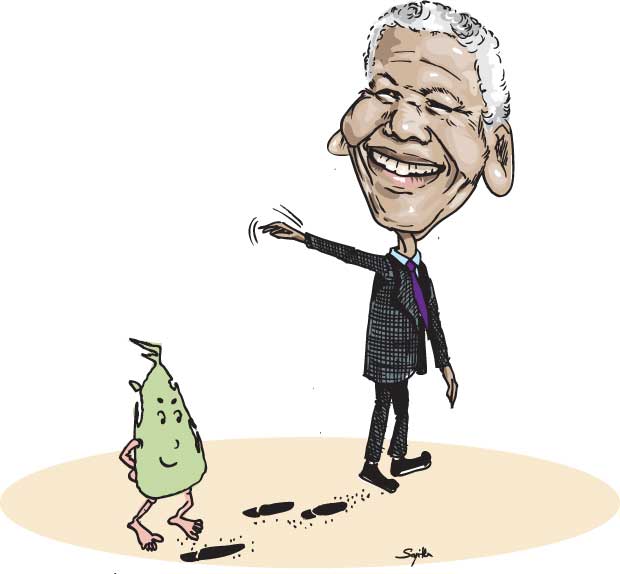13 Jul 2017 - {{hitsCtrl.values.hits}}

Next week on Thursday, July 18 we celebrate the 99th birth-anniversary of South Africa’s first coloured President and legendary freedom fighter Nelson Mandela who is widely regarded as one of the noblest leaders of modern times.
It is one of the rare events where the United Nations celebrates the birthday of a world leader for his heroic battle for freedom, justice and democracy.
“It is easy to break down and destroy. The heroes are those who make peace and build,” the United Nations quotes Nelson Mandela as saying.
The UN says everyone has the ability and the responsibility to change the world for the better, and Mandela Day is an occasion for everyone to take action and inspire change.
For 67 years, Nelson Mandela devoted his life to the service of humanity — as a human rights lawyer, a prisoner of conscience, an international peacemaker and the first democratically elected President of a free South Africa.
The Nelson Mandela Foundation is dedicating this year’s Mandela Day to action against poverty, honouring Nelson Mandela’s leadership and devotion to fighting poverty and promoting social justice for all.
In December 2015, the UN General Assembly decided to extend the scope of Nelson Mandela International Day to also be utilized to promote humane conditions of imprisonment, to raise awareness about prisoners being a continuous part of society and to value the work of prison staff as a social service of particular importance.
The UN General Assembly not only adopted the revised UN Standard Minimum Rules for the Treatment of Prisoners, but also approved that they should be known as the “Nelson Mandela Rules” to honour the legacy of the late South African President, who spent 27 years in prison in the course of his struggle for freedom, justice and democracy. The UN General Assembly proclaimed Mandela’s birthday, July18, as “Mandela Day”, marking his contribution to the anti-apartheid struggle. It called on the people to donate 67 minutes to doing something for others, commemorating the 67 years that Mandela had been a part of the movement.
Essentially Nelson Mandela was a servant leader. After decades of a battle against the white supremacists he was elected President in 1994 for a five-year term. He was so respected by the people that he could have gone on for two or three terms. Yet he decided to quit after one five-year term in office, giving a lesson to world leaders.
In Sri Lanka former President Mahinda Rajapaksa who was elected in 2005 amended the Constitution to give him the power to go on for more than two terms or for a lifetime. The former President was so confident of his position or popularity that in November 2014 he called an early presidential election, two years before schedule. Perhaps he did not foresee the dramatic crossover that took place in November 2014 when the then Health Minister and Sri Lanka Freedom Party General Secretary Maithripala Sirisena crossed over to form what was described as a rainbow coalition.
In the presidential election on January 8, 2015, Mr. Sirisena’s rainbow coalition soared to a spectacular victory. As a result we today have a national unity government between the two major parties, the United National Party (UNP) and the Sri Lanka Freedom Party (SLFP).
President Sirisena in one of his first speeches from the Dalada Maligawa pledged he would be a servant leader and work for the abolition of the wide-powered Executive Presidency. He and other government leaders also committed themselves to work towards the mission of a peaceful, just and all inclusive society. We hope that in our country also we would see a Nelson Mandela who is sincerely ready to go beyond personal gain or glory and work for freedom, justice and democracy.
29 Oct 2024 29 Oct 2024
29 Oct 2024 29 Oct 2024
29 Oct 2024 29 Oct 2024
29 Oct 2024 29 Oct 2024
29 Oct 2024 29 Oct 2024